
By Dr. Jeffrey Morrison
You may be taking dietary supplements because it’s healthy. With so many nutritional supplements available on the market, the claims are confusing. Are these supplements helping or harming you?
Recently, the media has focused on the supplement industry as two separate studies published in prestigious medical journals called into question the safety of supplements.
Numerous news broadcasts have raised the question; should you stop taking supplements?
My answer – It depends.
After reviewing these articles, here’s what you need to know about taking your supplements.
The first study from the Archives of Internal Medicine examined data from over 38,000 women in the Iowa women’s health study. Its conclusion was that taking supplements such as a multivitamin or iron might increase the risk of death. One key statistic they used to arrive at this conclusion was that 41% of women taking a multivitamin died by 2008 and 40% of women who didn’t take a multivitamin died in the same time frame. I don’t regard this difference as statistically significant, meaning the outcome could be by chance.
Also, the mention of increased deaths with the use of iron supplements in the study population, was not surprising or new information. It is well known to nutritionists and healthcare providers that iron should not be given to women that are not having menstrual cycles, because iron leads to oxidative stress (early aging of cells). Conversely, women that do have a regular menstrual cycle frequently develop iron deficiency and require iron supplements to prevent anemia.
The data used to arrive at the statistics was collected only three times over the course of 19 years, leaving a heavy reliance on the individual’s recall to complete the forms. There was no differentiation between types or quality of the vitamins and the researchers had no way of validating whether the data was accurate or reliable.
As I see it, the study reinforces the need for people to work with a qualified healthcare provider to who can do appropriate blood tests to determine if a nutritional deficiency exists and then develop a plan on how to supplement it. Because the study was poorly controlled and not statistically significant, there is no reason to suspect that taking a multivitamin will increase the risk of death, as long as it is free of iron.
The second study from the Journal of the American Medical Association (JAMA) reported a 17% increased chance of prostate cancer in men taking alpha-tocopherol, a form of Vitamin E. This was a surprising conclusion because previous studies in animals showed a protective effect of Vitamin E.
Vitamin E is a family of fat-soluble vitamins with antioxidant effects (slows cellular damage). It is found in foods such as seeds and grains and is divided into 4 tocopherol and 4 tocotrienol subunits. Retail versions of Vitamin E can be found as natural or synthetic and as alpha-tocopherol, like in the study, or with a mix of tocopherols and tocotrienols.
In the JAMA article, it was not clear whether the natural or synthetic versions of Vitamin E was used, nor did the authors elaborate on why they used only one family member of the Vitamin. This is like claiming that bread is unhealthy without differentiating whether the type of bread is refined white bread or the unprocessed whole grain version.
The best this article can suggest is that taking the refined version of Vitamin E, alpha-tocopherol, alone can increase the risk of prostate cancer. However, nothing can be said about taking the unprocessed, entire family of vitamin E in food or in supplement form.
While there is so much attention on taking supplements, I want to give some perspective on the death rate of people taking prescription medications. In 2009 the CDC reported that 37,485 deaths were caused by improper prescribing of painkillers and tranquilizers, which exceeded the number of deaths from motor vehicle accidents (36,284) and firearms (31,228). In fact, it is estimated that over 100,000 people die every year from taking improperly prescribed medications in hospitals.
So, should you stop taking your supplements?
1. The articles do not provide any new evidence or information that will help us decide on the appropriate use of taking a multivitamin, iron or Vitamin E.
2. Try to get your nutrition in the form of whole foods, like locally grown organic vegetables, seasonal organic fruit and humanely raised animal products.
3. When you are not able to eat whole, natural organic foods, taking a supplement may be necessary to replace nutrients deficient or missing in your diet.
4. Work with your nutritionally minded healthcare provider to check blood work that will assess for nutritional deficiencies and then develop a plan on how to supplement appropriately and safely.
For more information on how to develop a whole foods meal program visit www.morrisonhealth.com